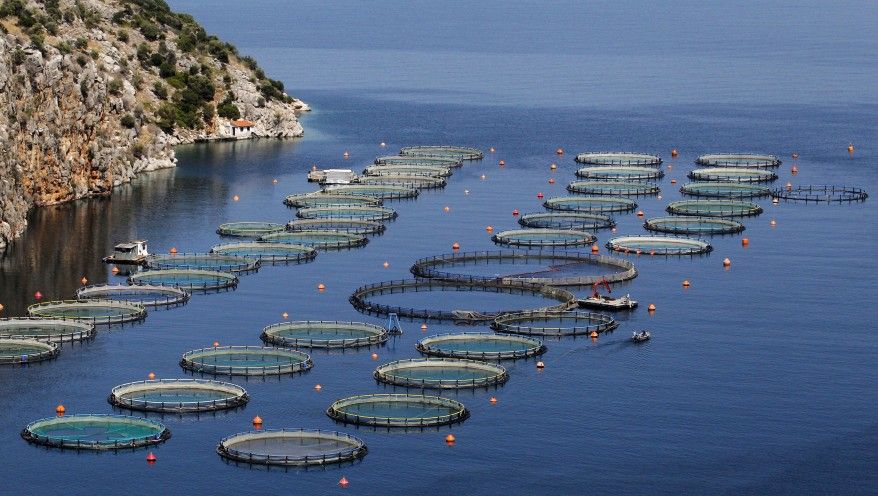CA fish-farming: Concept praised, but project opposed
by Chris Reed | December 28, 2015 10:31 am
 Eating fish is very healthy. Risks of overfishing are growing. For both these reasons, government officials around the world have frequently offered broad, general praise for aquaculture — fish farming — and its potential to provide a large new supply of healthy food. According to official estimates, fish farming has tripled since the turn of the century. A United Nations forecast that fish farming would supply half the world’s catch by 2030 used to seem unlikely — but not anymore.
Eating fish is very healthy. Risks of overfishing are growing. For both these reasons, government officials around the world have frequently offered broad, general praise for aquaculture — fish farming — and its potential to provide a large new supply of healthy food. According to official estimates, fish farming has tripled since the turn of the century. A United Nations forecast that fish farming would supply half the world’s catch by 2030 used to seem unlikely — but not anymore.
So far, global aquaculture has been concentrated in unhealthy, environmentally degrading mass fish farms in Asia. This has led to ambitious plans in California to “do aquaculture the right way.” In January 2014, the Coastal Commission approved [1]a “shellfish ranch” project in federal waters off Catalina Island. Now an immense San Diego undertaking — the Rose Canyon Fisheries Sustainable Aquaculture Project — is gaining attention and turning heads. This is from an October 2014 Voice of San Diego account[2]:
[A] partnership between [the Hubbs-SeaWorld Research Institute] and private equity firm Cuna Del Mar, it will be the first commercial offshore fish operation in the United States. The term “offshore” means the farm will sit beyond the three-mile mark typically regulated by the state, but still within federal waters.
The sheer size of the project – 29,000 square meters, or about six football fields — means it will be the first and most ambitious offshore operation of its kind. The project will start with half-a-million yellowtail the first year, with the ability to scale up to 10 million fish per year (5,000 metric tons) at full capacity.
Objections to San Diego proposal emerging
But saying the project “will be” this or that assumes it will come to pass. A year later, the project still has momentum, but some key environmental groups have decided they’re not on board. They object to the project’s effects on ocean views and raise much more sweeping concerns as well, as this KPBS report explains:
Matt O’Malley, a lawyer with San Diego Coastkeeper, [said], “We’re talking about putting a floating factory farm right off the coast of San Diego.” …
O’Malley points out 11 million pounds of fish would create a lot of, well, fish poop, and said that waste could change the chemistry in the water below the farm and on the ocean floor, and could lead to algae blooms.
He also worries fish could escape the cages and spread diseases or breed with wild populations, hurting genetic diversity. Plus, he worries seals and sea lions would be attracted to all of those caged fish and get entangled in nets and ropes, and that the farm could change whale migrations and wild fish behavior.
It’s not clear how the Coastal Commission will react to the environmental concerns. Rose Canyon Fisheries officials express deep confidence in their studies, some of which were launched nearly a dozen years ago. But SeaWorld’s role in the project could be problematic, given the commission’s recent move to block [3]the San Diego aquatic park from breeding more killer whales, a move that included some commission members denouncing the park’s killer whale shows as amoral and unwelcome in California.
Commission has heeded concerns about effects on views
Another point of note is that the initial, seemingly less serious concern raised by San Diego Coastkeeper — about the effect of the fish farm on coastal views — has a history of winning favor with commission staff and members.
In 1997, San Luis Obispo engineer Dennis Schneider began attempts to win regulatory approvals for a 10,000-square-foot home on a bluff over looking the Pacific Ocean. In 2000, he got the go-ahead from city officials. But the Coastal Commission subsequently blocked the project on the grounds that it would be an aesthetic affront to kayakers, surfers and others using the ocean near the home.
In 2006, however, a state appeals court sided with Schneider. This is from the Los Angeles Times’ account[4]:
Less-than-pleasing views for passing sailors are no grounds for the California Coastal Commission this week to restrict seaside development, a state appeals court ruled Wednesday.
“We believe that it is unreasonable to assume that the Legislature has ever sought to protect the occasional boater’s views of the coastline at the expense of a coastal landowner,” the 2nd District Court of Appeal wrote in a unanimous opinion.
It’s not clear if the Coastal Commission would find this ruling binding or applicable to the Rose Canyon Fisheries project, however.
The project is expected to come before the state panel sometime next year.
- approved : http://articles.latimes.com/2014/jan/11/science/la-sci-sn-shellfish-ranch-approved-20140111
- account: http://www.voiceofsandiego.org/topics/news/meet-san-diegos-aquacowboy-and-the-project-that-could-transform-american-seafood/
- block : http://www.latimes.com/business/la-fi-seaworld-vote-reaction-20151009-story.html
- account: http://articles.latimes.com/2006/jun/30/local/me-view30
Source URL: https://calwatchdog.com/2015/12/28/ca-fish-farming-concept-praised-project-opposed/